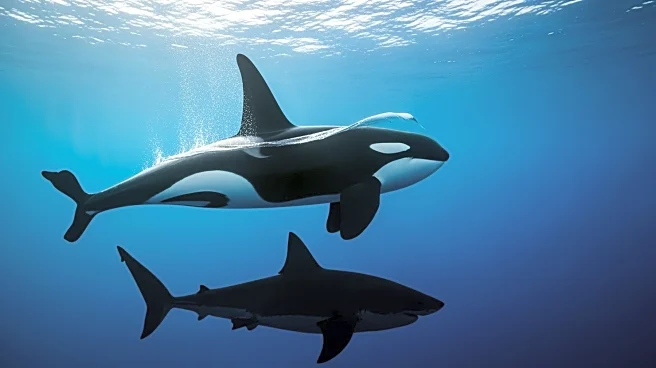What's Happening?
Recent research in the Gulf of California has documented orcas preying on young great white sharks, specifically targeting their nutrient-rich livers. This behavior was captured using drone footage and other recording methods, marking the first time such
interactions have been documented in Mexico. The study, published in the journal Frontiers in Marine Science, highlights multiple incidents where orcas immobilized sharks by flipping them onto their backs, inducing a state known as tonic immobility, which facilitates the removal of the liver. This behavior has been observed in other regions like South Africa, Australia, and California, but its documentation in Mexico provides new insights into the ecological dynamics of the area.
Why It's Important?
The documentation of orcas hunting great white sharks in the Gulf of California is significant as it suggests a potential new pressure on shark populations in the region. The behavior indicates that juvenile white sharks may become a regular prey target for orcas, which could have implications for the conservation and management of both species. The study's findings contribute to a broader understanding of orca predation strategies and their impact on marine ecosystems. The ability of orcas to efficiently hunt and consume shark livers, which are rich in nutrients, underscores their adaptability and the potential for learned hunting behaviors to spread within orca populations.
What's Next?
The study's findings may prompt further research into the frequency and impact of orca predation on shark populations in the Gulf of California. Conservationists and marine biologists may need to consider these interactions when developing strategies for the preservation of both orcas and great white sharks. Additionally, the documentation of this behavior could lead to increased monitoring of orca and shark populations in the region to better understand the ecological balance and potential long-term effects.
Beyond the Headlines
The study highlights the role of learned behavior in orca hunting strategies, suggesting that certain orca groups have developed specialized techniques for hunting sharks. This behavior, once established, becomes part of the group's hunting culture, potentially affecting the distribution and behavior of shark populations. The research also emphasizes the value of drone technology in marine biology, providing new perspectives on predator-prey interactions that were previously difficult to observe.















